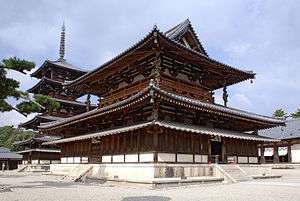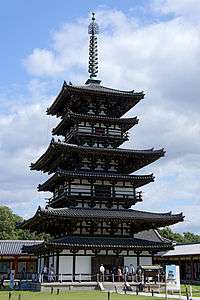Mokoshi
In Japanese architecture mokoshi (裳階・裳層, also pronounced shōkai), literally "skirt storey" or "cuff storey", is a decorative pent roof surrounding a building below the true roof.[1] Since it does not correspond to any internal division, the mokoshi gives the impression of there being more floors than there really are.[1] It is usually a ken deep and is most commonly seen in Buddhist temples and pagodas (see for example the article tahōtō).[1][2] The mokoshi normally covers a hisashi, a walled aisle surrounding a building on one or more sides, but can be attached directly to the core of the structure (the moya), in which case there is no hisashi.[1] The roofing material for the mokoshi can be the same or different (see for example's Hōryū-ji's kon-dō) as in the main roof.

Origin and purpose
The name derives from the fact that it surrounds and hides the main building like the cuff (裳裾, mosuso) of a pair of pants.[3] Its purpose was in fact to hide the thick sustaining pillars of the structure, making it look lighter and simpler.[3] It has been used extensively by the Zen sects in various structures of its temple complexes.
Another name for a mokoshi is yuta (雪打, lit. snow strike), hence the name yuta-zukuri (雪打造, yuta style) given to the style of a building featuring it.[2] This name started being used during the Middle Ages, and stems from the idea that its presence offered protection from snow.[3]
Significant examples
The three storied east pagoda of Yakushi-ji (a National Treasure, see gallery) seems to have six stories because of the presence of a mokoshi between each story.
The first of the kon-dō's (main hall, National Treasure, see gallery) two stories at Hōryū-ji has a mokoshi, which was added in the Nara period with extra posts. These were needed to hold up the original first roof, which extended more than four meters past the building. Hōryū-ji's is the oldest extant example of mokoshi.[3]
The butsuden (main hall) of a Zen temple usually has a mokoshi, and therefore looks like a two-story building (see photo above and gallery), although in fact it is not.
Gallery
The following structures all have a mokoshi.
 Hōryū-ji's kon-dō
Hōryū-ji's kon-dō Yakushi-ji's three-storied east pagoda
Yakushi-ji's three-storied east pagoda Myōshin-ji's butsuden
Myōshin-ji's butsuden Tōdai-ji's Daibutsuden
Tōdai-ji's Daibutsuden
See also
Notes
- "Mokoshi". JAANUS - Japanese Architecture and Art Net User System. Retrieved 2009-11-21.
- Iwanami Kōjien (広辞苑) Japanese dictionary, 6th Edition (2008), DVD version
- Shogakukan's Nihon Daihyakkasho, Mokoshi, accessed on November 27, 2009 (in Japanese)